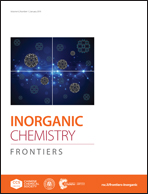UV-enhanced NO2 gas sensing properties of polystyrene sulfonate functionalized ZnO nanowires at room temperature
Abstract
Polystyrene sulfonate (PSS) functionalized ZnO nanowires were hydrothermally synthesized and assembled into a UV-activated optoelectronic NO2 sensor for the first time. In situ PSS functionalization during hydrothermal synthesis not only facilitated the formation of high-quality ZnO nanowires with small diameters and high aspect ratios, but also significantly improved the UV photoconductance of ZnO nanowires through photo-induced electron injection, leading to the enhanced optoelectronic properties of ZnO nanowires. The optoelectronic NO2 sensors based on PSS-functionalized ZnO nanowires showed much higher responses and faster response rates under UV illumination at room temperature (25 °C). The responses ranged from 60% to 690% toward NO2 concentrations of 50 ppb to 2 ppm. Moreover, the optoelectronic sensors exhibited excellent reversibility, good stability and a low detection limit (5 ppb), making the efficient, optically controlled sensing of ppb-level NO2 gas possible.



 Please wait while we load your content...
Please wait while we load your content...